These days, banking and financial industries place a high priority on safeguarding consumer identities and information which should be the case everywhere in the world. They have developed a process known as, “Know Your Customer,” or KYC. This process of validating a customer’s identity and risk profile can help these institutions prevent fraud and adhere to regulatory compliances.
This blog will look at how blockchain technology may increase security and efficiency while also aiding with KYC verifications.
How is Blockchain related to KYC?
Instead of being governed by one central authority, blockchain data is dispersed over a network of computers. Blockchain is perfect for applications like KYC that need safe data processing because of this feature.
The special characteristics of blockchain immediately meet KYC verification needs. Blockchain may greatly lower the dangers of data breaches, which are increasingly a key worry in KYC procedures, by providing a safe, impermeable means of storing data.
Challenges in Traditional KYC Verification Processes
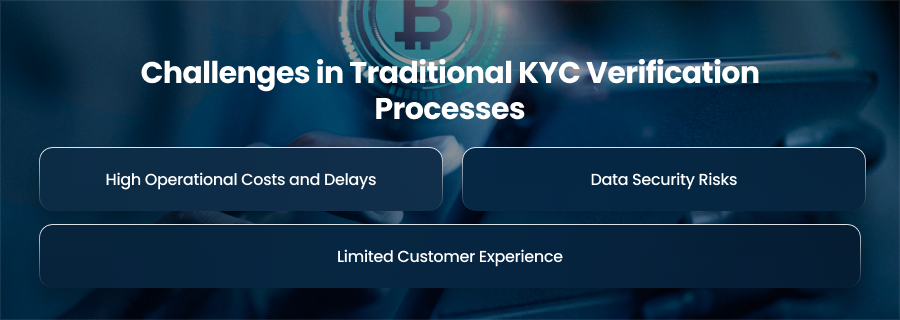
Conventional KYC techniques entail gathering, confirming, and preserving client data, frequently via labor-intensive, expensive, and human error-prone manual procedures. For businesses looking to satisfy stringent legal obligations while maintaining smooth client experiences, these difficulties have created a bottleneck. Among the main difficulties are:
High Operational Costs and Delays
Traditional KYC often involves repetitive identity verification, increasing processing times and costs. Organizations must continuously verify data, even if the same customer has already been verified elsewhere.
Data Security Risks
Sensitive client data is at risk due to centralized databases’ vulnerability to breaches. Transparency and data security are more critical than ever, because to heightened regulatory scrutiny.
Limited Customer Experience
Customers sometimes have to go through the same verification procedures with several institutions when utilizing conventional KYC, which frustrates them and deters user involvement.
Benefits of Blockchain in KYC Verification
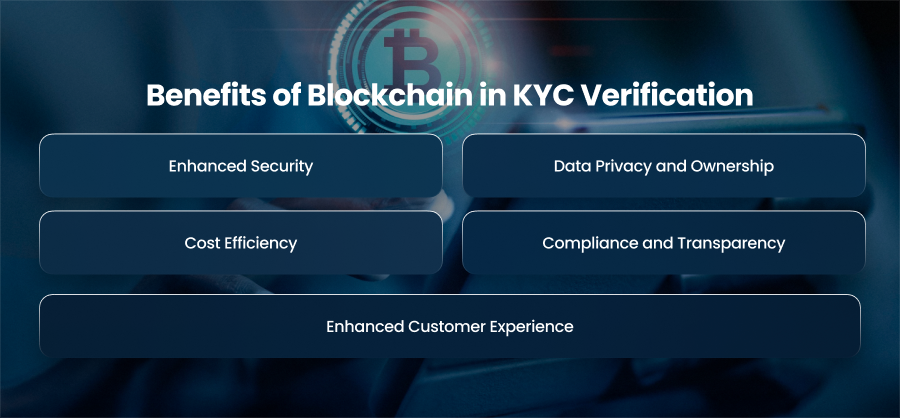
Enhanced Security
The decentralized data storage and encryption features of blockchain lower the possibility of cyberattacks and data manipulation. A blockchain enhances security by storing client data on a distributed network as opposed to a single controlled database. Furthermore, data cannot be changed once it is recorded due to blockchain’s immutability, which offers a safe record of each KYC procedure step.
Data Privacy and Ownership
People may take charge of their personal data thanks to blockchain’s permissioned access. Consumers may accept and revoke access to their data, allowing businesses to verify their consumers without retaining too much sensitive information. The notion of “self-sovereign identity” improves the security of crucial data while protecting user privacy.
Cost Efficiency
With blockchain, redundant data checks are reduced, as verified identities can be securely shared across institutions. By automating verification through smart contracts, blockchain development also minimizes manual errors and associated labor costs, making KYC more cost-effective.
Compliance and Transparency
Blockchain’s public ledger and real-time audit trails facilitate regulatory compliance. The blockchain permanently records all verification activities, making it easier and more accountable for financial institutions to meet tight compliance standards.
Enhanced Customer Experience
Customers may utilize a single blockchain-based KYC to confirm their identity across several organizations. By eliminating the need for multiple identity checks and facilitating a more seamless onboarding process, this simplified method increases consumer convenience.
How Blockchain Streamlines KYC Processes?
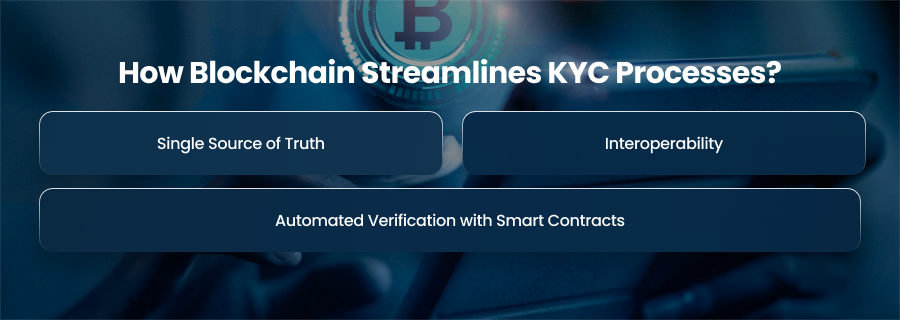
Because blockchain removes duplication and allows for automated procedures, KYC verification becomes even more efficient. This is how it operates:
Single Source of Truth
Blockchain allows for the creation of a universal digital ID for users that can be verified once and used across multiple institutions. This minimizes repetitive identity checks and creates a single source of truth that institutions can trust.
Automated Verification with Smart Contracts
Data verification and compliance checks are two parts of the KYC process that smart contracts may automate. This speeds up the verification process overall, minimizes human participation, and gets rid of manual mistakes.
Interoperability
Blockchain makes it possible for several businesses to share data easily, establishing a system that eliminates the need for recurrent consumer verification by each institution. Efficiency is increased by this method, especially for clients dealing with several financial institutions.
Real-World Use Cases of Blockchain-Based KYC Solutions
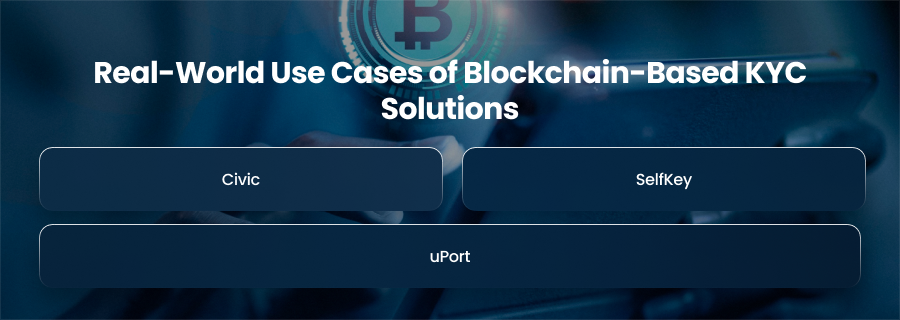
Numerous companies and organizations are currently looking into blockchain-based KYC solutions to address present problems and enhance the client experience:
Civic
An identity management solution built on blockchain technology that lets users create a secure, verifiable digital ID without storing personal data on a central server. Civic’s platform improves security and efficiency by providing a secure way to share identifying information with trustworthy partners.
SelfKey
Users may take control of their personal data and only provide it when necessary using SelfKey’s self-sovereign identity management for KYC. SelfKey’s solution is particularly relevant for industries like bitcoin, where identity verification is crucial for regulatory compliance.
uPort
Decentralized identification and KYC solutions from uPort, which use the Ethereum blockchain, enable people to share verified credentials with other companies while keeping identity control.
Challenges and Limitations of Blockchain in KYC Verification
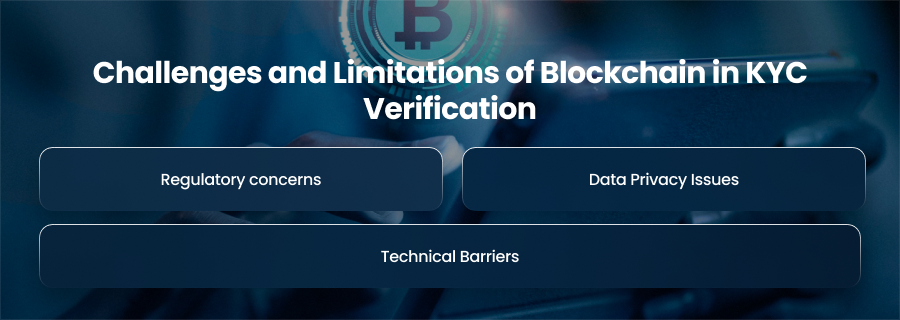
Blockchain offers numerous benefits, but before it can be extensively applied in KYC, a few problems need to be fixed:
Regulatory concerns
Because of its decentralized nature, it could be challenging to comply with laws like the General Data Protection Regulation (GDPR).
Data Privacy Issues
On a public blockchain, striking a balance between privacy and openness may be challenging. Private blockchains provide a solution, but they can restrict the transparency and interoperability that make blockchain so attractive for KYC.
Technical Barriers
Blockchain implementation for KYC necessitates a large training and technological investment. Furthermore, connecting to current systems might be problematic, especially for major financial institutions.
Final Words
Blockchain has immense potential to improve KYC verification and move us closer to a day where user-controlled, secure identities are the norm by improving security, improving compliance, and creating a more seamless customer experience. Blockchain might become an important component of KYC if legislative frameworks alter to incorporate this technology, setting new standards for consumer verification efficiency and security.




